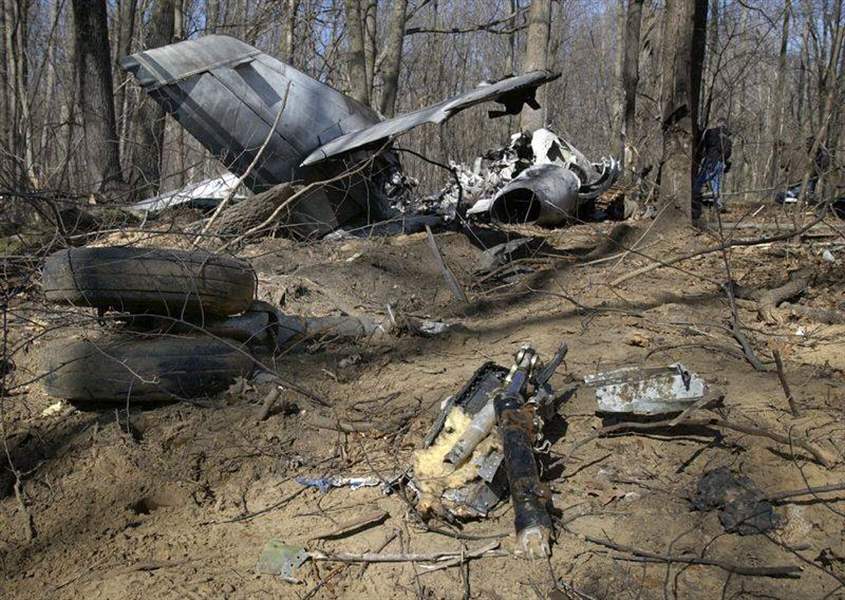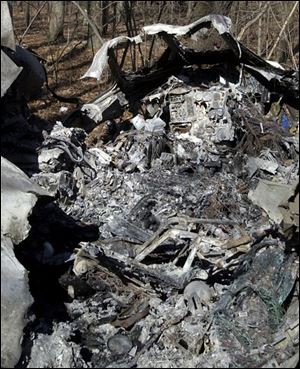
Grand Aire suspends all flights; port board leader confirms Toledo-based carrier's decision after 2 disasters
4/10/2003
The tail section and landing gear lie amid other burned wreckage of the Falcon 20 plane that crashed Tuesday about two miles southwest of Toledo Express.
Grand Aire Express voluntarily suspended all flight operations yesterday afternoon, one day after two of the Toledo-based company's jets crashed in separate incidents - one of them fatal.
James Hartung, president of the Toledo-Lucas County Port Authority, told The Blade that Grand Aire's founder and president Tahir Cheema told him of the decision during a telephone conversation at about 4 p.m. yesterday. Earlier in the day, Grand Aire staff at Toledo Express Airport said the air charter firm was flying as usual.
Mr. Cheema, contacted twice by phone last evening, refused to confirm or deny Mr. Hartung's report.
“Today is Day One for us,” he said from his office at the company's Swanton Township headquarters at the airport.

The burned-out cockpit is among the wreckage in Oak Openings.
Elizabeth Isham Cory, an FAA spokesman, said the regulatory agency had not ordered Grand Aire to shut down, and she said she couldn't confirm whether Grand Aire had notified the FAA of its decision.
But she said Grand Aire would have to tell the FAA if the air cargo company will be shut down for anything longer than a “day or two.” That way regulators would be better able to monitor that the firm is continuing required maintenance and training, she said.
Three pilots died when a twin-engine Grand Aire Falcon 20 went down shortly before 2 p.m. Tuesday about two miles southwest of Toledo Express Airport. Just 51/2 hours later, two other pilots were injured when the same model cargo jet they were flying crashed into the Mississippi River near St. Louis.
Bob Hancock, the National Transportation Safety Board's investigator at the scene of the Toledo area crash, said the Grand Aire jet was making its second landing attempt when it went down in a wooded area of Oak Openings Preserve Metropark and burst into flames.
“Exactly what the circumstances were, we don't know,” Mr. Hancock said during a news conference yesterday afternoon.
Also still to be determined, Mr. Hancock said, is who among the three aboard was flying the plane, which had dual controls. Aboard were Grand Aire's chief pilot, Wallis Bouldin, 32, of Louisville; David Davenport, 40, of Ottawa County's Harris Township near Elmore; and Steven William “Will” Forshay, 37, of Springfield Township.
Mr. Bouldin was a Falcon captain and a certified flight instructor. Mr. Davenport was certified as a first officer on the Falcon. Mr. Forshay was normally a pilot of Grand Aire's twin-engine, turboprop Metroliner aircraft, and may have been using the flight from Traverse City, Mich., to Toledo as a training run. The plane had delivered cargo on its outbound flight but was returning to Toledo empty.
The aircraft had no flight data recorder and Mr. Hancock said he did not think the aircraft had a cockpit voice recorder. Radar data and communications tapes from the Toledo Express control tower will be reviewed to see if they yield any clues about the doomed flight's final minutes, the investigator said.
Missed approaches are most common in poor visibility conditions, and such conditions existed at the time of Tuesday's crash. Between 1:33 and 2:03 p.m., the National Weather Service station at the airport reported visibility of over a mile but a cloud ceiling of just 300 feet, with fog and mist.
Several people in the area at the time reported hearing what they considered to be unusual engine noises before the crash, but said the poor visibility kept them from seeing anything. The plane cut a swath about 200 yards long through trees before hitting the ground.
The extensive fire that followed has complicated the investigation, Mr. Hancock said, but “we are documenting what we can find.” He said he expected to return to the crash scene this morning to complete the on-site portion of the work.
“We are still gathering data, and we've got a long ways to go,” he said. “The facts will tell us later why this happened.”
After cataloging the “perishable evidence,” the investigation will proceed to reviewing the control tower tapes and other data, conducting interviews, and studying personnel and mechanical records, he said.
“We're still looking at everything,” Mr. Hancock said, estimating that the investigation will take “six months, minimum.
“It's a complex airplane,” he said. “There are a lot of issues to look at. We're only beginning to scratch the surface.”
Mr. Hancock said he will be in touch with the NTSB investigator looking into the St. Louis crash, which reportedly occurred after that plane, too, missed a landing approach in poor weather. Before the crash, its crew reported being critically low on fuel, then declared an emergency and told air controllers that its engines had failed.
The Falcon 20 in the St. Louis incident crashed into the Mississippi River. The pilots were plucked from the river and transported to hospitals there.
St. Louis police said yesterday afternoon that Saleem Iqbal, 34, who resides in Houston but maintains a Maumee apartment, was in serious condition, while Mohamed Saleh, 44, of Springfield Township, was in fair condition, both at St. Louis University Hospital.
Lou Genide, special agent in charge of the Federal Bureau of Investigation's Toledo office, said agents conducted preliminary interviews yesterday in case the two crashes turn out to be related.
“Our understanding as of midday, after talking with the NTSB, is that they don't suspect any foul play,” Mr. Genide said.
Mr. Hancock said his agency's role is strictly accident investigation and making recommendations aimed at preventing future accidents. It is the FAA's responsibility, he said, to determine if any actions, or inaction, by Grand Aire constitute violations of its air carrier certification.
The FAA's Ms. Cory said air traffic controllers at Toledo Express notified authorities of the Grand Aire plane's disappearance from their radar screens, but reported receiving no distress calls. The disappearance was logged at 1:52 p.m.
Aircraft continued to land at Toledo Express Tuesday afternoon after the crash, using the same approach pattern over the scene to the airport's main runway.
The airport's Instrument Landing System was deactivated at 2:10 p.m. for a comprehensive inspection to determine that it was working properly, Ms. Cory said. The system was determined to be operating properly and was returned to service at 6:35 p.m., she said.
Along with its Toledo headquarters, Grand Aire maintains operational bases in Louisville, Dallas, Phoenix, Denver, Oakland, and Columbia, S.C. Up until suspension of flights, its primary business was charters for both cargo and people, the latter under the Executive Aire Express banner.
Income from Grand Aire represents a fairly small portion of the port authority's overall airport revenue of $7 million.
Last year the firm paid about $106,500 to the port authority in rents, fuel flowage fees, and landing fees for its 10 to 15 daily flights. By contrast, heavy freight carrier BAX Global's hub operations at Toledo Express generated $850,000 in landing fees and $75,000 in fuel flowage for the port authority last year.
Mr. Hartung said Mr. Cheema had given him no specific time frame for when Grand Aire might return to the skies.
“I think he's being a prudent businessman,” Mr. Hartung said. “He's concerned - this has been a traumatic experience for him.”